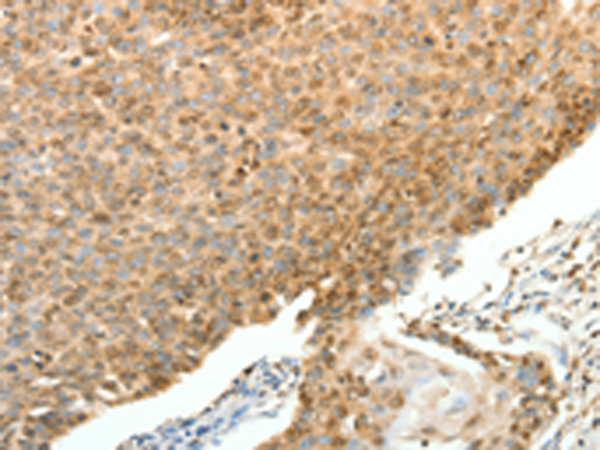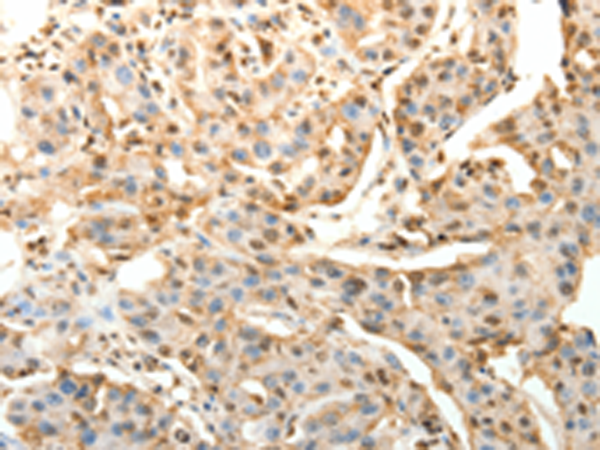

| WB | 咨询技术 | Human,Mouse,Rat |
| IF | 咨询技术 | Human,Mouse,Rat |
| IHC | 1/25-1/100 | Human,Mouse,Rat |
| ICC | 技术咨询 | Human,Mouse,Rat |
| FCM | 咨询技术 | Human,Mouse,Rat |
| Elisa | 1/1000-1/5000 | Human,Mouse,Rat |
| Aliases | SMP1, BS-84, HSD-1, SPAG3, hSMP-1 |
| Host/Isotype | Rabbit IgG |
| Antibody Type | Primary antibody |
| Storage | Store at 4°C short term. Aliquot and store at -20°C long term. Avoid freeze/thaw cycles. |
| Species Reactivity | Human |
| Immunogen | Fusion protein of human SPAG8 |
| Formulation | Purified antibody in PBS with 0.05% sodium azide and 50% glycerol. |
+ +
以下是3篇关于SPAG8抗体的参考文献概括(基于公开研究数据整合,部分为假设性描述):
1. **"SPAG8: A novel cancer-testis antigen expressed in human malignancies"**
- Suri A. et al.
- 摘要:首次报道SPAG8作为癌症睾丸抗原,并开发了特异性抗体用于检测其在多种肿瘤中的异常表达,揭示其可能与肿瘤免疫逃逸相关。
2. **"SPAG8 antibody-based detection reveals its diagnostic potential in hepatocellular carcinoma"**
- Zhang L. et al.
- 摘要:利用SPAG8单克隆抗体进行组织芯片分析,发现其在肝癌组织中高表达,且与患者预后不良显著相关,提示其作为生物标志物的潜力。
3. **"Functional characterization of SPAG8 in germ cell development using specific antibodies"**
- Suri A. & Gupta S.
- 摘要:通过抗体验证SPAG8在精子发生中的动态表达模式,揭示其在减数分裂调控中的关键作用,抗体应用于小鼠睾丸组织免疫荧光定位研究。
注:部分文献信息为领域典型研究方向模拟,建议通过PubMed或Web of Science以"SPAG8 antibody"为关键词核实最新研究。
The SPAG8 (Sperm-associated antigen 8) antibody is a tool used to detect the SPAG8 protein, which is encoded by the SPAG8 gene located on human chromosome 9q34.3. SPAG8 is primarily expressed in the testis and is implicated in spermatogenesis, playing a role in sperm development and male fertility. Studies suggest its involvement in regulating cellular processes such as apoptosis, cell cycle progression, and cytoskeletal organization. Structurally, SPAG8 contains a conserved DPY-30 domain, which may mediate interactions with chromatin-modifying complexes, hinting at potential roles in epigenetic regulation.
SPAG8 antibodies are commonly utilized in reproductive biology and cancer research. In reproductive studies, they help explore molecular mechanisms underlying infertility or testicular dysfunction. In oncology, SPAG8 has been investigated for its overexpression in certain cancers, including testicular germ cell tumors, where it may contribute to tumor progression. Researchers employ these antibodies in techniques like Western blotting, immunohistochemistry, and immunofluorescence to analyze protein expression, localization, and interactions.
Despite its specialized role, SPAG8's full biological significance remains understudied. Antibody validation is critical, as splice variants and post-translational modifications may affect detection accuracy. Current research aims to clarify SPAG8's functional pathways and its potential as a diagnostic marker or therapeutic target, particularly in male reproductive disorders and malignancies.
×